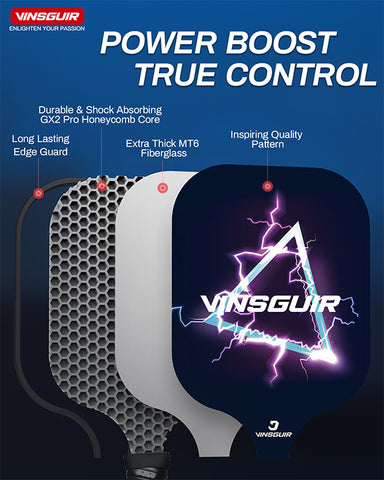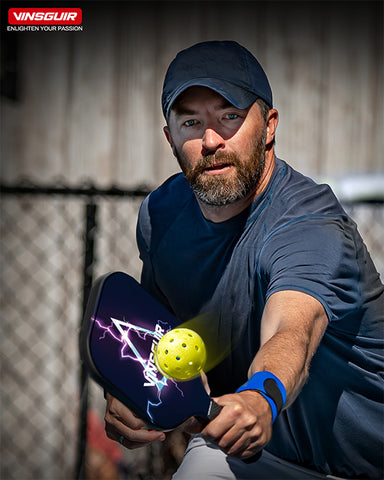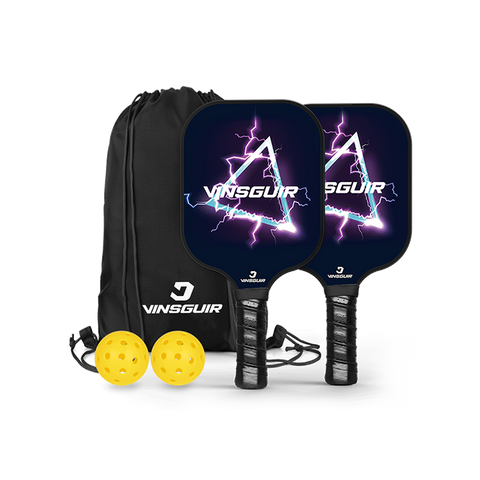
One of the most important things to consider when choosing a pickleball paddle is weight. The weight of the paddle affects your ability to play the game.
Paddle weight guidelines are as follows:
Light paddle (<7.2 oz)
Medium weight paddle (7.3-8.4 oz)
Heavy paddle (>8.5 oz)
As we explain in our Beginner's Buying Guide, new players are encouraged to choose a lightweight paddle that is easier to swing, more accurate and has a quicker wrist action. If you are using a paddle that is too heavy, you will tire quickly.
Known for its controllability, the lightweight paddle is perfect for touch players who prefer drop shots to hard shots and slams. Plus, it has a faster response time when at the net and blows the ball away. The downside is that lighter paddles produce less power.
If you have played table tennis or racquetball before and are switching to pickleball, a lightweight paddle is a good choice as these sports involve wrist movement.
Lightweight racquets are a popular choice for doubles players.

not too light
Using a paddle that is too light can cause some problems. If you use a paddle that is too light for your strength, you will swing faster than you normally would and you may miss your shot.
Additionally, the lighter the paddle, the less powerful the shot. If your shots are less powerful than normal, you may be using a lighter paddle. Paddle weight is key to power, so consider buying a heavier paddle in that case.
medium weight pickleball paddle
Medium weight paddles are a good option if you are unsure of the right weight for you and are available for players of all levels.
Medium weight paddles are a great combination of power and control. Players looking for a game that combines finesse and power should choose a paddle that is neither too light nor too heavy. They don't offer the same level of control or power as light or heavy paddles, but they are suitable for all playing situations.

heavyweight pickleball paddle
Players who prefer power over control tend to use heavier paddles.
The heavier the paddle, the faster you can swing the paddle, but it takes more effort to get the paddle up to that speed.
In singles, as in singles tennis, power trumps finesse, so heavy paddles are more common. Dinks and drop shots are less common in singles pickleball than they are in doubles pickleball.
don't get too heavy
Using a paddle that is too heavy for your strength can cause some problems. If the paddle is too heavy, the ball will be out of control and will fly in a different direction than intended.
Also, heavy paddles increase the chance of injury. For example, after playing pickleball for a day, he may experience pain in his wrists and arms. In this case, the paddle may be the culprit and you should consider getting a lighter paddle.
How to choose a pickleball paddle weight
To determine the ideal pickleball paddle weight, there are a few things to consider. Unfortunately, there is no one size fits all solution when it comes to pickleball paddles.
First is your power. You should find paddles within your strength range and avoid paddles that are too heavy. Lighter paddles are easier to swing and require less muscle strain than heavier paddles.
Next, think about what you value most in your game: control or power? Light for control, heavy for power.
Try a few different paddles to see which one feels most natural.
avoid tennis elbow
When choosing a pickleball paddle, you should choose one that is well balanced and comfortable.
When hitting the ball, the lighter the paddle, the greater the vibration and the greater the strain on the elbow. So if you are prone to tennis elbow, a lightweight paddle may not be the best choice.
The downside of heavy paddles is that your arms can get tired quickly. It can also cause problems for players with tennis elbow.
In general, medium weight paddles are the best place to start if you suffer from tennis elbow. However, consider other factors such as material and shape. It can affect the comfort and satisfaction of pickleball paddles.


